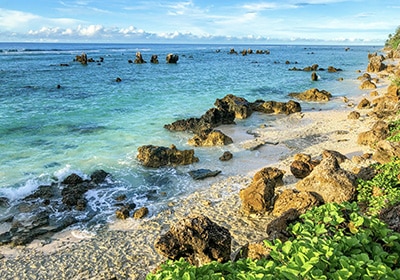If you’ve ever considered moving to a South Pacific country, Nauru likely wasn’t the first island to spring to mind. It’s small, remote, and has limited infrastructure and foreign relationships, so living in Nauru comes with unique challenges but also peace, tranquility, and a disconnect from fast-paced lifestyles.
Keep reading to learn more about living in Nauru as a foreign national and the pros and cons of Nauruan life.
Life in Nauru

Life on Nauru island is deeply rooted in community. This isolated lifestyle comes with no traffic lights, few cars, and just one major ring road circling the island. Life moves at a snail’s pace, and social ties are strong—many Nauru residents know each other by name.
Though Nauru lacks the urban buzz of other South Pacific islands like Fiji and the Solomon Islands, its peacefulness and security are unmatched. Nauruans are prideful people and welcome foreign nationals. However, limitations on most goods, entertainment, and international travel options won’t appeal to everyone considering moving to Nauru.
Living Conditions in Nauru
Housing in Nauru is simple and modest. With no real estate industry, there are no upscale beach front villas or luxury homes. Most Nauru residents live in government-supplied housing. While few would be called affluent, the cost of living in Nauru can be high due to heavy reliance on imports, especially food and electronics. The islands phosphate lands and previously dominant phosphate mining industry has meant limited local produce.
 Healthcare
Healthcare
Healthcare services are as basic as it gets. The Republic of Nauru Hospital is the only hospital on the island, and specialized medical care requires air evacuation to Australia. The quality of health care in Nauru is often reflected in the health of the island’s inhabitants. Nauru has one of the highest high blood pressure levels and male diabetes rates in the world.
 Education
Education
Three public primary schools and two secondary schools provide primary and secondary education. The University of the South Pacific has a campus in Nauru, but most residents seek Australian education for their higher education needs.
 Utilities
Utilities
Water and electricity are inconsistent during dry seasons or adverse weather. Nevertheless, the country established its first solar energy plant in 2016, and the Nauru government introduced the Nauru citizenship by investment program in 2024 to improve renewable energy infrastructure and national sustainability.

Working and Doing Business in Nauru
Unless you’re highly specialized in a specific field critical to governmental priorities, substantial ancillary employment opportunities in the small island nation are few and far between. Jobs are centered around government contracts in education, healthcare, and the processing of asylum seekers, though the influx of asylum seekers and Australian aid to fund processing centers has effectively ceased.
Salaries tend to be lower than global averages and other Pacific islands, but some positions—especially those filled by expats—can offer competitive wages and housing packages.
A small number of businesses operate on the island, including shops, local transport providers, and construction services, and Nauru taxes are generally favorable for starting a business.
Business regulations are relatively straightforward, but the close Australian-Nauru relations and financial aid that contribute significantly to the national GDP have meant foreign investment in Nauru’s economy is minimal and not considered economically advantageous among most foreign nationals.
Nauru’s economic history is a tale of highs and lows. Once considered the wealthiest country in the world per capita, Nauru received significant economic interest from colonial powers after phosphate deposits were unearthed in 1900. Following years of unsustainable phosphate mining, the national economic crisis occurred after Nauru exhausted existing deposits.
In an effort to undo the damage phosphate mining caused and reduce reliance on external economic stimulus and foreign aid, the Nauru citizenship program was introduced, offering a Nauru passport to foreign nationals who contribute to Nauru’s economy.
Pros and Cons of Living in Nauru
Pros:
- Tight-knit community: Nauru residents make up a small population that values belonging and safety.
- Tropical climate: Year-round warm weather and ocean views make for beautiful natural surroundings.
- Sustainable living: A key agenda of the Nauru government is sustainability, which includes promoting renewal energy and sustainable fishing practices.
- Simple lifestyle: Life in Nauru is simple and stress-free, making it ideal for those looking to escape the fast-paced urban life.
- Straightforward residency: A Nauru citizenship by investment lawyer can easily facilitate relocating to Nauru.
Cons:
- Limited amenities and entertainment: The island has few restaurants, shops, or recreational options, and things to do in Nauru are generally limited to basic activities like lounging by the sea or chatting with locals.
- Healthcare limitations: Significant medical emergencies or advanced care requires traveling overseas.
- High cost of goods: Nauru produces very little, and everyday items are more expensive than most developed countries.
- Employment restrictions: There are few fob opportunities and prospects for career growth.
- Limited banking: There is only one bank in Nauru, and the country has no offshore banking options.
Frequently Asked Questions about Living in Nauru
Do they speak English in Nauru?
While most Nauru citizens communicate in Nauruan, English is the official language, and all citizens can speak it.
Can Americans go to Nauru?
Americans can go to Nauru but must apply for a visa through the Permanent Mission of the Republic of Nauru to the United Nations to visit Nauru.
Is it easy to move to Nauru?
Nauru is historically one of the world’s least visited countries and has a strict visa policy. However, the new Nauru citizenship by investment official website offers information on qualifying for economic citizenship, which provides a simple path to move to the country.
Is it safe to live in Nauru?
With a small land area and practically all Nauru residents knowing each other, crime in Nauru is virtually nonexistent, making the country one of the safest places to live.



